The great thing about Doctor Who is how much of it there is to watch. The bad thing about Doctor Who is just how MUCH of it there is to watch, especially when you factor in the various spin-offs. Far and away the oddest of those is Torchwood. Set in the Cardiff headquarters of the organisation introduced in “Army of Ghosts” during the Tenth Doctor’s run, the series followed a team led by Captain Jack Harkness including newly recruited police officer Gwen Cooper (Eve Myles), intuitively brilliant scientist Toshiko Sato (Naomi Mori), softly spoken butler and badass Ianto Jones, laddish doctor Owen Harper (Burn Gorman), with Gwen’s fiancé Rhys Williams (Kai Owen) and her former partner PC Andy Davidson (Tom Price) rounding out the main cast.
Torchwood was WEIRD. Pretty much in every way. The unlikely collision between the cheerfully grumpy pragmatism of Cardiff and alien life was brilliant, the cast was always impressive and, on occasion, the scripts were incredible. On others, well…not so much. The show has been streaming on Twitch recently and is also available on Amazon Video and physical discs. A lot of it… isn’t great. At all. But the stuff that’s good is really worth your time. Here are the ten standouts for me.
[Some spoilers for individual episodes of Torchwood below.]
“Everything Changes,” Season 1, Ep. 1 (Written by Russell T Davies)
PC Gwen Cooper witnesses a strange group of “specialists” resurrecting a murder victim long enough to ask him what killed him. She’s drawn into their world and discovers the truth about Torchwood, the mysterious government organisation based under the city of Cardiff…
It’s not a universal truth that a great pilot means an uneven first season but…well…this is a really excellent pilot, even though a lot of what follows isn’t on the same level. The chemistry between Eve Myles’ gloriously laconic, unflappable Gwen and John Barrowman’s darkly flamboyant Jack is especially fun, and the script does a great job of walking the viewer through the organization, introducing the various characters and what they do. It lays on the “alien artifacts corrupt” thing a little thick (or, in Owen’s case, dumps it by the bucketload) but even that element of the script leads to a great payoff. Torchwood always aimed to be edgy, and the degree of edginess it reaches here, with a group of brilliant, slightly broken people surfing the edge of the ragged singularity, helps to make it one of the series’ most successful installments.
“Out of Time,” Season 1, Ep. 10 (Written by Catherine Tregenna)
Torchwood Cardiff encounter the Sky Gypsy, an aircraft that vanished in 1953 when it flew into the Cardiff Rift. They help the pilot, Diane Holmes, and her passengers, John Ellis and Emma-Louise Cowell, to adjust as best they can to the modern world, but some manage it better than others…
This is the show’s first attempt to humanise Owen Harper, who—despite Burn Gorman’s best efforts—remains the least likable character at this stage. It works well, too, and Gorman is excellent here, as Owen’s hedonistic cocoon is cracked open by Diane. Louise Delamere is excellent as the brave, open-hearted, and determined pilot and Diane ended up serving as the template for a lot of the series’ future one-off guest stars: characters with an agenda all their own and a sense that their story is a larger arc intersecting with the episode, rather than being contained within it.
The rest of the cast impresses, too. Olivia Hallinan’s Emma-Louise is a light, comedic character, but one who comes from a place of sincerity and gets one of the show’s relatively few happy endings. In contrast, Mark Lewis-Jones’ turn as John Ellis is as dark as Torchwood gets. Crushed by the guilt of discovering that his son is still alive, suffers from Alzheimer’s and has no one to care for him, John commits suicide. And Jack, unable to do anything else, dies with him, holding John’s hand so he won’t be alone. That would be powerful, brave storytelling by itself, but combined with the fact that Jack can’t die (he immediately resurrects), it becomes a complex and poignant moment for them both in an episode filled with affecting moments.
“Kiss Kiss, Bang Bang,” Season 2, Ep. 1 (Written by Chris Chibnall)
It’s the show’s other pilot episode! After a first season notable for being extremely dour and bad-tempered, “Kiss Kiss, Bang Bang” really does feel like a soft reset for the series. From the old lady muttering “BLOODY Torchwood!” as the SUV speeds by to the acknowledgement of Jack’s “holiday” over on Doctor Who Series 3, this feels like Torchwood seen through entirely different—and far more cheerful—eyes. In this light, Ianto’s crack about how maybe Jack would feel better if he stood on a rooftop and brooded a bit is especially great.
But what truly makes the episode is Captain John Hart, played with exuberant psychopathic charm by the mighty James Marsters. John is Jack with none of the corners knocked off or edges sanded down: a joyous murder teddy bear who wants to drink, sleep with, and/or kill everyone and everything. Probably all at the same time.
In fact, definitely at the same time. Starting with that poodle.
Marsters and Barrowman are a just flat-out joy to watch, playing Jack and John as men who don’t know whether to kill or kiss each other first, so are just going to do it all at once. It’s a brilliant move, showing us exactly how far Jack has come since the start of the show and how much his past still defines him. Better still, it underscores how far the team have progressed and as the episode comes to a close, Torchwood has finally stepped out of Doctor Who’s shadow and found its own voice. It’s a sweary, proudly Welsh, and often very funny voice, too.
“Sleeper,” Season 2, Ep. 2 (written by James Moran)
Torchwood are asked to consult on a case, investigating the fatal injuries sustained by a pair of burglars. They were killed in the flat of Beth Halloran (played by the always excellent Nikki-Amuka Bird) and her husband, and it looks like Beth was responsible. But how? And why can’t she remember what happened?
This is one of the episodes, like “Adrift,” that takes the somewhat nebulous aspect of Torchwood’s premise and turns it a feature, not a bug. What works best in this episode is the way a personal narrative—the tragedy of Beth and her husband—is nested inside a larger, darker story. Bird (known for her work with the Royal Shakespeare Company as well as TV and film roles) is one of the strongest actresses of her generation, and she does excellent work here as a woman who slowly realises that everything she knows is a lie. It all culminates in one of the best examples of the complex, untidy endings the show would become very fond of over the course of its run. The Doctor usually gets to save the day; Torchwood, a lot of the time, do not.
“Adrift,” Season 2, Ep. 11 (written by Chris Chibnall)
…which brings us to this episode. Gwen is asked by Andy to look into a missing persons case. In doing so, she discovers a score of people who’ve disappeared in the same way. And Jack, for some reason, doesn’t want the case looked at too closely…
I know I’m only focusing on ten episodes here but there’s a strong case to be made for just sitting down and watching (or rewatching) all of Season 2. The season as a whole doesn’t always work, but it tries a whole bunch of new things—including the tragic three-episode arc centering on a series of traumatic events inflicted on Owen and this episode, which feels like the embodiment of the show’s opening line: “The 21st century is when it all happens. And you’ve got to be ready.”
Cardiff isn’t ready. Gwen isn’t. Jack is. And this episode’s lack of a tidy resolution is arguably one of the bravest things the show does. It also cleverly uses the fact Gwen’s a police officer while exploring how that benefits her as well as what it costs her. She understands problems and is trained to deal with them; she’s conditioned to believe you can talk someone down, or slap the cuffs on someone. To believe that she can win, or at least balance the scales. This episode forces her to realize, irrevocably, that Torchwood isn’t the police and that kind of certainty, that worldview, is something she can no longer expect or rely on. The best that she can do is to simply do the work that may lead her successors to firmer ground and greater certainty. “Adrift” is a brave episode that swings for the fences, hinging on stellar turns from Barrowman, Gareth-David Lloyd, and Eve Myles, and it remains one of the show’s quieter, more successful hours.
Torchwood: Children of Earth, Season 3, 5 Episodes (written by Russell T. Davis, John Fay & James Moran)
Torchwood Season 3 is one of the best pieces of TV drama produced in the last 50 years. Opening with an alien race called the 456 suddenly speaking through every child on earth and never once slowing down from the opening scene on, the series combines kitchen sink British drama and existential cosmic horror with the narrative consequences of everything the show has been building to over the previous two seasons. The 456 have been to Earth before, and the British Government made a terrible bargain at that time, exchanging innocent lives in order to save the world from a deadly virus. Jack is one of the few people who knows what happened, and as a result, he and his entire team are targets. To make matters worse, Jack’s family are directly in the firing line, and this time, the 456 are demanding much, much more.
There’s a tangible anger to Children of Earth that puts it next to other genre greats like the final season of Quatermass and Edge of Darkness. All three have a bitterly realistic, cynical view of government and how it deals with crises, and all three shows assume the worst of people as a group and the best of people as individuals. That’s especially true here, both with Jack and John Frobisher. A Home Office Permanent Secretary, Frobisher is the dark mirror to Torchwood. He knows what’s happening, knows what he’s been told is the right thing to do, and continually struggles with both the crushing horror of the choices that must be made and what it will cost him. Peter Capaldi is typically great as Frobisher, banally evil and deeply relatable, and the series’ best moments tend to be his.
But not all of them: The consequences of Jack’s immortality, and his centuries playing the Great Game with cosmic powers, finally come home to roost, here. This is the solution to the equation posed by the last two seasons, balancing Jack as master manipulator against Jack as hero, and the result is something darker than any other plot twist the modern show has ever produced. It’s also Barrowman’s best work in the role by a considerable margin; likewise Eve Myles and Gareth-David Lloyd (whose work in this season is matched only by his extraordinarily strong performances in the Torchwood audio dramas).
Children of Earth is a hard watch but an essential one. It’s Torchwood’s finest hour, a brilliant summation of the central themes of the show and a genuinely great piece of modern science fiction.
Taken as a whole, Torchwood is uneven, unpredictable, and occasionally brilliant. These ten episodes represent, for me, the very best of the show, and provide the foundation on which Big Finish’s excellent audio dramas continue to build. It’s remains far and away the most uneven of the various Who spinoffs—but also, if you catch the right episodes, one of the all-time best.
Alasdair Stuart is a freelancer writer, RPG writer and podcaster. He owns Escape Artists, who publish the short fiction podcasts Escape Pod, Pseudopod, Podcastle, Cast of Wonders, and the magazine Mothership Zeta. He blogs enthusiastically about pop culture, cooking and exercise at Alasdairstuart.com, and tweets @AlasdairStuart.










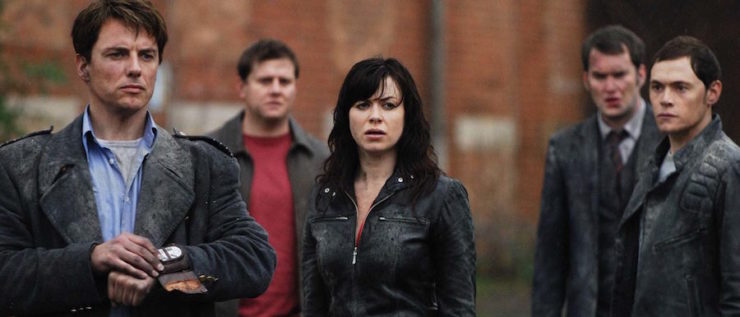
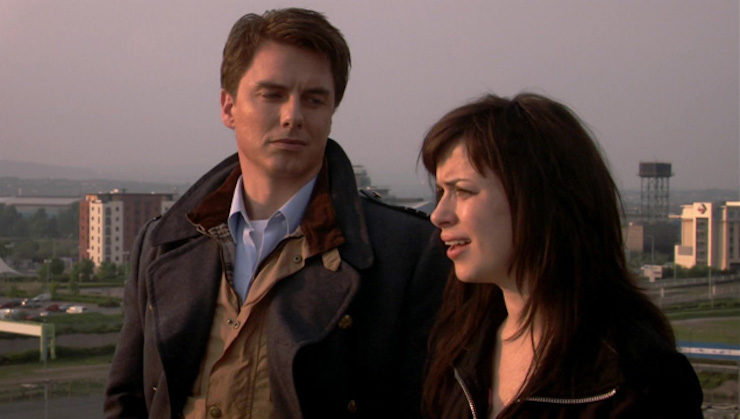
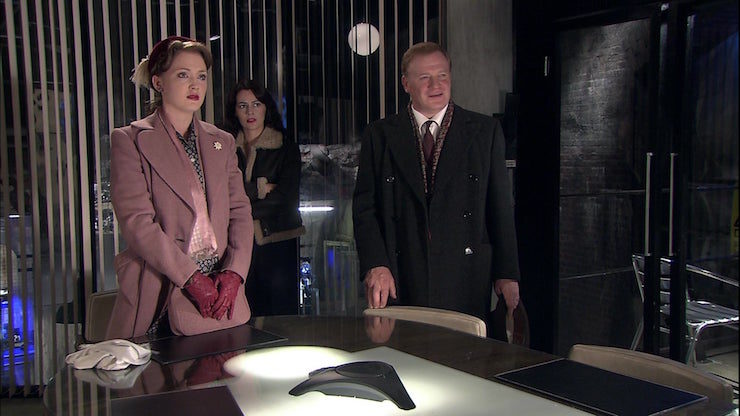
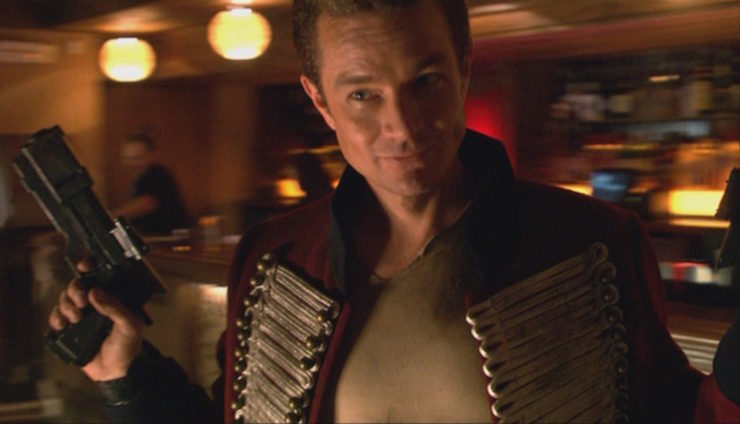
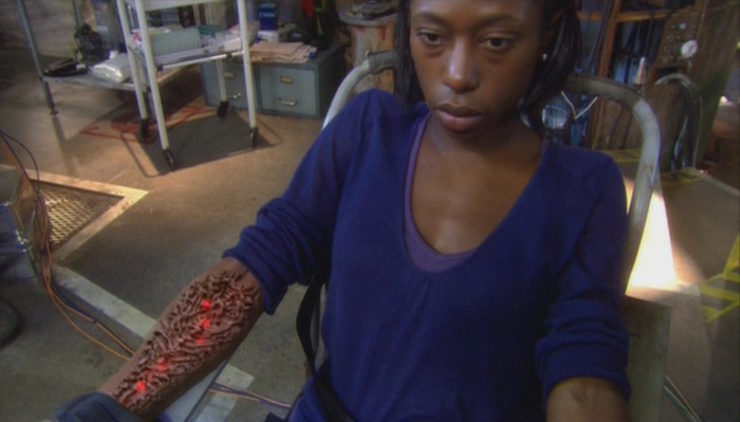
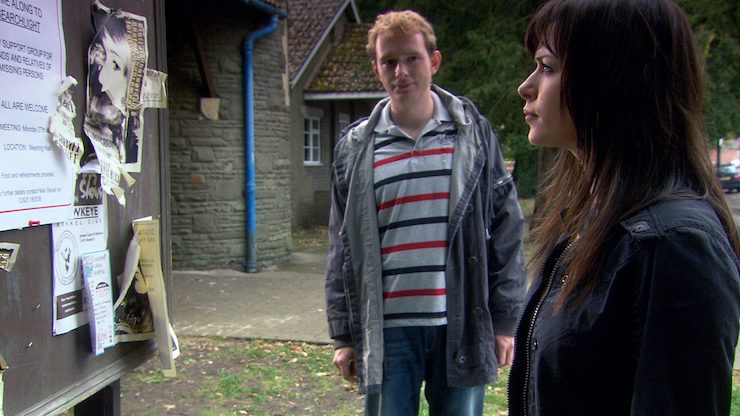
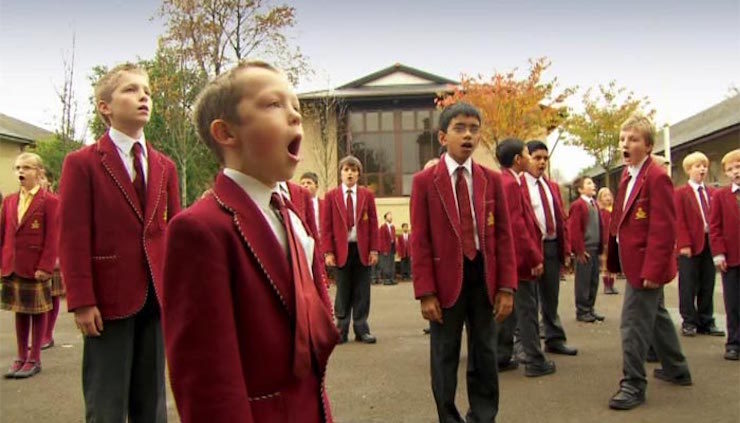
Agreed 100% on Children of Earth, which was one of the greatest TV seasons in the history of the medium. It’s why I punched the air with glee when Capaldi was announced as playing the Doctor.
—Keith R.A. DeCandido
Children of Earth is amazing TV that I will never, ever rewatch.
I loved Torchwood for all the reasons mentioned in the the text, and especially agree with this sentiment:
“Torchwood Season 3 is one of the best pieces of TV drama produced in the last 50 years.”
Yes! Thank you! For some reason, it gets surprisingly little love from most people I know, but I consider it one of the finest pieces of British television. I just don’t want to watch it EVER again – I couldn’t go through all this pain a second time.
Children of Earth remains the best piece of sci fi I’ve ever watched and I will never watch it again.
Literally the only thing I’ve ever said that about.
I see you left out season 4.
Good – it was awful in a half-dozen different ways.
@5. Nate: Only a half dozen? Let me count the ways… Actually, I’d dump it all together and call that entire season a loss.
I have always liked Small Worlds from the first season.
I will never ever watch Children of Earth EVER AGAIN ! Once was more than enough it’s great drama but way to dark for me. I enjoy the characters in Torchwood especially Gwen and Ianto but didn’t really like the series as a whole. I finally figured out one of the things I didn’t like; the Torchwood’s team at the end of the episode 90% of the time was to kill the alien, or some other character in the episode dies. I’m not looking for sitcom solutions here but the occasional happy ending would have been nice.
As uneven as the show was, it had some wonderful moments. John Barrowman is a delightful actor, always larger than life. And Eve Myles very capably anchored the often-fanciful show in the real world with her excellent portrayal of Gwen.
I agree with the episodes listed above, and also enjoyed “Greeks Bearing Gifts,” and “To the Last Man” because I liked Tosh, and she didn’t get enough time at center stage. And “Something Borrowed” was another favorite, with an alien invader interrupting Gwen’s marriage. And I enjoyed the temporary addition of Freema Agyeman as Martha Jones to the team. As much as I liked Donna, I never thought Martha got enough time to spend with the Doctor.
“Children of Earth” was one of the most compelling, and gut-wrenching, things I ever watched on TV. I binged it one day when I was home sick, and found it deeply moving.
It is too bad “Miracle Day” never found its feet, and the series ended on kind of a sour note.
I will point out that Big Finish did a number of very good audio dramas with the cast. And while I haven’t heard them all, there is a new series that takes the story forward, with new members added to the team.
Nice to see Torchwood get some love, and that’s a good selection of best episodes. Also good to see some recognition of the BF Torchwood audios, which have told many solid new stories and expanded the Torchwood universe.
“Miracle Day” started out so promising, and went so very off the rails, it’s really too bad. Sigh.
—Keith R.A. DeCandido
The absolute nadir of “Miracle Day” was when Gwen blew up the facility that housed her father and other victims of the plague, or whatever they were calling it. She had a dramatic scene riding away on a motorcycle as explosions started behind her. Looked cool and all, but there were many innocent people still inside, including healthy staff. Passing judgment on the corrupt politicians is one thing. Killing everyone indiscriminately is another.
Really, truly, deeply atrocious writing. It was disgustingly, self-righteously moralistic, and anti-American to boot. It seemed like they were trying a kind of Tea Party critique (which I would’ve been sympathetic with), but failed almost completely to understand American politics.
The whole premise of Miracle Day is dubious. About 55 million people die a year, all over the planet, most of them elderly. Is it really such an immediate crisis if they stop dying?
Torchwood seasons 1 and 3 were brilliant.
I was put off season 2 by efforts to try to make Owen look nicer: he was introduced to us in episode 1 as a serial rapist, and it appears that Torchwood’s creators never realised that this would colour our view of Owen through the rest of the series. (One of the small details that was great about season 3 was that Owen wasn’t in it.)
In season 2 I got the distinct impression that the creators were playing frantic catch-up on Owen – “look, look, he’s a nice person really” – a kind of belated redemption arc without ever really understanding what Owen needed a redemption arc for.
@13, yes, I hated that silly graphic at the beginning, where the population clock ticks upward slowly, then starts whirring upward. As you say, about 55 million die, and about 130 million are born, so the clock should have sped up by 75% at most. If the population increase rate of a world of immortals bothers you, so should today’s population increase rate–they’re not that different.
This ties in to broader science fiction discussions of how awful immortality, or even increased longevity, would be, because the population would start to grow. It bugs me because I know many of the people who say that aren’t bothered by population increase, as long as people are dying on time. Like the joke goes, they don’t appear to be there for the huntin’.
I think the Miracle Day scriptwriters had a mental picture of births and deaths almost exactly balancing at present.
Another possible source of Miracle Day=disaster would be that people who would die become people who need end-of-life levels of care. How critical that is depends on how long you think people need end-of-life levels of care now. I make a wild guess we need it for the last decade of our lives, which means Miracle Day starts to require a 10% per annum growth in care homes and carers. But the plot only takes a few days, that shouldn’t lead to emergency warehouses of sick old people right away.
I was so heartbroken by the abysmal Miracle Day, despite a great acting job by Bill Pullman, always a favorite, that I haven’t watched my DVDs of the good seasons since seeing that. Time to forgive the show and dig them out again.
Biggest omissions from the above list in my view are all from season 1: Countrycide & the 2 part season finale Captain Jack Harkness/End of Days.
I stopped watching Torchwood after the “Children of Earth” series. It was mostly brilliant, but it was also deeply immoral fiction. There’s the sequence where Captain Jack says he’ll never give in, then folds immediately as soon as someone close to him is affected.
There’s the sequence where the British government acknowledge that they’re never going to arrange things to affect themselves, but always push the Danegeld of children off on “the others.” I might have been able to live with that if anyone had suggested that last time it was (IIRC) 32 children, and now it’s 10% of all children (in the world, or in the UK? I can’t recall if that’s made explicit). What happens next time? Is it worth survival at that cost? That’s the question that I wanted the show to wrestle with.
And I hated the deus ex machina of there just happening to be one particular child that was eligible to for the necessary sacrifice to save the day. It was intentionally heart-wrenching, but it was also really lazy plotting.
I gather I didn’t actually miss much by giving up on Torchwood at that point, but I’m still angry about it when I think about it. Even if I am (as I seem to be) in a minority.
@18: I understand your problem with the whole “What happens the next time the 456 come back?” But I feel as though the government have a “Let’s cross that bridge when we come to it,” mentality and by assuming the 456 won’t return for another 40-50 years (as they did from 1965-2009 which will be outside most of their lifetimes), they make it someone else’s problem to deal with, which is perfectly in line with the selfish politicians we have seen throughout the season, as well as the 1965 government that agreed to the 456’s demands in the first place.
My personal quibble is with the nature of the 456. We only ever see one of them in the tank, and this leads to the question of: Are there any other 456? Where are they? In some kind of spaceship? Was the whole “We will wipe out your entire species” a bluff? Why didn’t the others react to the murder of their ambassador? I feel that because the 456 weren’t properly introduced until Episode 3, none of these questions could appropriately be tied up in just 2.5 episodes. This doesn’t seriously knock the quality of the series for me though. It just makes me wonder if there was actually only one rogue 456 alien that was trying far too hard to impress other 456 aliens and went way out of its depth targeting Earth. I like the inherent mystery of the aliens as well. Have they pulled this deal anywhere else? How did they discover human children could provide the “hit?” There were seeds sown for a possible reappearance further down the line, but I think with the failure of S4, it scuppered any plans for a possible American continuation.
Shame, really.
The last, American season was some of the worst television I have ever seen, with terrible “American” characters, and enough plot for one hour of television stretched into an entire bone-chillingly boring season of television!
For me the worst thing about the “Miracle Day” version of immortality is that it didn’t appear to stop any natural processes or allow for repair of damage; it just kept your consciousness permanently tethered to your (increasingly failing and/or damaged) body. The bit near the beginning where they’re trying to conduct an autopsy on one of the bombing(?) victims and the eyes are still moving around in that charred skull even after they start snipping various nerves & bits of connective tissue …
“My personal quibble is with the nature of the 456. We only ever see one of them in the tank, and this leads to the question of: Are there any other 456? Where are they? In some kind of spaceship? Was the whole “We will wipe out your entire species” a bluff?”
I hadn’t thought of that, but I like it, for one reason outside of the story. Torchwood is part of the Doctor Who universe, and that should put constraints on the show that its writers sometimes want to ignore. If the 456 were really a threat to the continued existence of the human species, the Doctor would show up. Groups like UNIT, Torchwood, Sarah-Jane and her young friends, and the kids at Coal Hill School can only do so much. Sometimes you need the Doctor to save the day. You want to tell stories about overwhelmingly dangerous threats to humanity without the Doctor saving the day, maybe don’t tell your story in the Doctor’s universe.
I think I got through three episodes of Miracle Day, asked myself how they were going to wrap that fish in two or three more episodes, and quit right there when I realized that it would go on for quite a bit longer. Interesting premise, but just wretched execution.
Children of Earth, on the other hand, was brilliant. A truly alien antagonist, and what seemed to me like a vicious jerk of the head toward British class conflict. ‘Give the proles’ children to the 456, they’ll just breed more,’ was the message I received.
To the person who wrote the headline: You really don’t have to add “Ever”. There were only 4 seasons, not 39.
I couldn’t stand “Children of Earth”. Horrible. :-( “Out of Time” is by far the best episode. I also liked “Cyberwoman”, and all of season 4. Nobody agrees with me, probably.
@22 Gwen asks herself that question. I would like someone to ask the Doctor what he (FFS, how do I gender the Doctor now? He was male when the show aired, is female now and could be either in the future) thinks about her argument that sometimes humanity is too awful to be worth saving.
Children of Earth is awesome and hard to watch. If it was Dr. Who you would know there will be a miracle to save the day, with Torchwood you are preparing for PAIN.
It rates up there with “The Prisoner”.
I love the mention of Quatermass and Edge of Darkness, those were my favourite TV series when I was younger. So much so, that I only went to see Jurassic Park just because Sam Neil & Bob Peck were in it! :)
That last Quatermass series really did resonate with Children of Earth, although I feel Quatermass did it better with the aliens, the inclusion of the government conspiracy in Children of Earth, with the rounding up of children by the military, made up for it, and reminded me of the sort of edgy TV the BBC used to do. Like “The War Game”, f’rinstance.
The one thing that really bothers me about “Children of Earth” is how Jack sacrificed his grandchild. Not THAT he did so — it was necessary – but HOW. I really think that it would have been more in character for him to have convinced the boy to sacrifice himself. The child adored him, looked up to him, and loved playing soldier; I think if Jack told him it was noble; he would be the hero and save the world, the boy would have done it eagerly. The pathos would remain. Kids never really believe they will die, but Jack would know he was convincing the boy to commit suicide. And the social commentary might be even more pointed. Instead of the government simply being evil, there would be a clear parallel to how all governments take advantage of kids, to get them to join the military.
Honestly, I think my favorite episode is Countrycide. Aside from all of the fish-out-of-water jokes with Owen the city boy. But the incredibly brave thing they did was that it wasn’t aliens. Or monsters. Or anyone being mind-controlled. It was just people killing people “Because it’s fun”, and the realization that human beings can be as monstrous as anything in space/time.